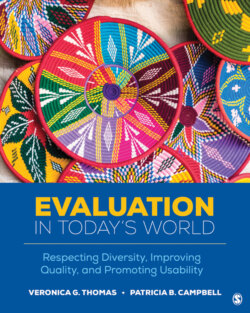Читать книгу Evaluation in Today’s World - Veronica G. Thomas - Страница 74
На сайте Литреса книга снята с продажи.
Ethical Sensitivity and Dilemmas
ОглавлениеEthics in evaluation is not simply related to doing the right thing or wrong thing, but is also related to ethical sensitivity. One of the early decisions that an evaluator may be confronted with is when a particular configuration of conditions, circumstances, and available choices should be framed and addressed as an ethical problem (Duggan & Bush, 2014). Ethical sensitivity includes an evaluator’s ability to recognize and respond to the ethical dimensions of diverse evaluation contexts. Evaluators with ethical sensitivity continuously anticipate and seek to address ethical dimensions in their work rather than be surprised by them or simply ignore them.
In practice, ethical sensitivity in evaluation involves three aspects: the evaluator’s awareness of or ability to determine whether a situation related to the evaluation or the evaluand involves an ethical issue, the evaluator’s ability to identify the particular ethical value(s) underlying the issue under consideration, and the evaluator’s awareness of the intensity of the issue.
First, the evaluator must be able to determine whether a situation related to the evaluation or the evaluand involves an ethical issue (i.e., awareness). This is a critical skill since oftentimes ethical issues go unnoticed because of their complexity or because of a particular cultural lens or unconscious bias on the evaluator’s part. There is a large body of research arguing that unethical behavior often stems from actions that individuals do not even recognize as unethical (Banaji, Bazerman, & Chugh, 2003; Chugh, Bazerman, & Banaji, 2005; Sezer et al., 2015; Tenbrunsel & Messick, 2004). Individuals have an “illusion of objectivity” by acting against their ethical values without conscious awareness of such behaviors (Bazerman & Tenbrunsel, 2011; Epley, Caruso, & Bazerman, 2006). For example, an evaluator may fail to realize that the perspectives of the most vulnerable program participants are being ignored by the funder or project director. Here, ethical insensitivity may occur due to the evaluator’s prejudices and biases toward the relatively powerless stakeholder group and favoritism toward the more powerful stakeholders. Evaluators can maintain what Bazerman and Tenbrunsel (2011) refer to as “ethical blind spots” as a result of seeing the world in a way that obscures one to the fact that a wrong or an unethical action (e.g., ignoring the perspective of the powerless) is occurring. In such instances, evaluators fail to see their own biases and subsequently fail to detect ethical dimensions in certain situations as a result. The activity that follows summarizes three sources of ethical blind spots evaluators might face: implicit bias, temporal distance, and failure to notice others’ unethical behavior.
